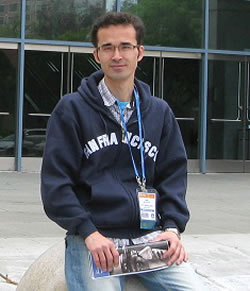On Saturday, November 17, APS co-sponsored an event with Amnesty International and several other organizations that highlighted the plight of physics graduate student and APS member Omid Kokabee who is serving a 10-year prison sentence in Iran.
November 19, 2013

Omid Kokabee
CIFS member Herb Berk, along with University of Texas at Austin student Ellen Hutchison, spoke about efforts at UT to bring attention to Mr. Kokabee’s case and advocate for his release from prison.
Dr. Arash Alaei, a renowned HIV/AIDS researcher, recounted meeting Mr. Kokabee in Evin prison while he was detained on charges of plotting to overthrow the government and communicating with the United States. He noted that Mr. Kokabee spent time teaching other prisoners languages and physics. He spoke of the attempts by military and security forces to coerce Mr. Kokabee into collaborating with them in exchange for his freedom.
During the event, Amnesty International announced that it had designated Mr. Kokabee a prisoner of conscience.
In January 2011, Mr. Kokabee was arrested in Iran after visiting family and trying to return to the University of Texas at Austin where he was pursuing a Ph.D. in optics. He was accused of receiving "illegal earnings" and "communicating with a hostile government." In May 2012, he was sentenced to 10 years for various national security offenses without any evidence being presented at his trial. He has never had access to his lawyer and has been denied medical treatment for kidney stones.
Mr. Kokabee was recently named one of the recipients of the 2014 APS Andrei Sakharov Prize for “his courage in refusing to use his physics knowledge to work on projects that he deemed harmful to humanity, in the face of extreme physical and psychological pressure.


